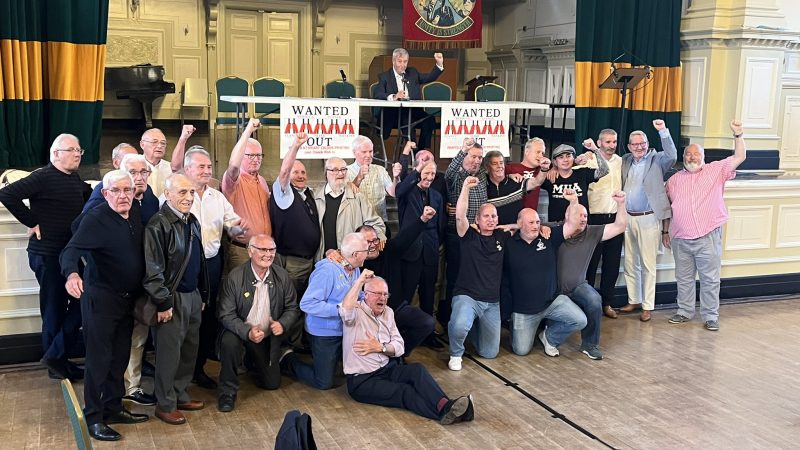
Below is the full text of the speech delivered by Labour MP Jon Cruddas to mark 50 years since an upsurge of strikes freed five dockers from Pentonville prison.
Good evening everyone. It is good to be with you all for this anniversary celebration. It is great to see so many here tonight to salute the Pentonville five and recognise this landmark event in British working class history.
Of course, in one sense, looking back the Chobham Farm dispute was a failure. It was a fight against containerisation and a defence of living standards and a 2,000-year history of dock work. A dispute in defence of the culture and the communities that work created across east London. That was lost. The container literally reset global capitalism and ushered in the era we now describe as globalisation.
The National Dock Labour Board, introduced by Labour in 1947, was subsequently abolished by Thatcher in 1989. By then it had come to be described by Employment Secretary Norman Fowler as a “total anachronism”. But, in another sense, the struggle fought by many in this hall tonight marked a major turning point in British economic and political history.
The five stewards were imprisoned in July for refusing to obey a court order to stop picketing Chobham Farm. The National Industrial Relations Court (NIRC) had issued an injunction following an application on the basis of the information supplied by private investigators hired by the Midland Cold Storage Company – reminiscent of more recent fights against the blacklist. Their arrest and imprisonment forced the TUC to call a general strike on July 31st. Thousands descended on Pentonville and the ‘five’ were released within a week of their arrest.
Why was this such a landmark? If you look back 1972 contained two historic moments in working class history. First: on the February 10th 1972, at Saltley Gates in Birmingham, when workers successfully stopped the transportation of coal. Pretty quickly Ted Heath surrendered to the miners pay claim, which basically broke the pay policy of his government. Second: July 31st 1972 and the release of the Pentonville five, which broke the power of the National Industrial Relations Court and consequently derailed the 1971 Industrial Relations Act.
The two key episodes proved fatal for the Heath government and soon Harold Wilson and Labour were back in power after an election characterised as being about who runs Britain. But tonight is not a nostalgia trip; the point is to learn from our history but not live in it.
On my first job, on the buildings in Australia, we had a pre-entry closed shop – you went to the Union Hall to get your ticket before you were allowed on any site. My first local official for our labourers union the BLF was Irish, from Donegal, and often quoted James Connolly at us youngsters. Most of it went over my head but I always remembered one quote he used to give us: we must draw inspiration “not from the mouldering records of the past, but from the glowing hopes of the living present, the vast possibilities of the mighty future”.
That quote has come back to me over the past few days. This week the government published moves to replace workers in dispute. A proposal to break strikes with agency workers. A reckless threat to public safety, which once more allows the treatment of British workers to fall far short of international standards. Just two months ago, we had the wretched, indeed illegal, decision by P&O to replace 800 workers with agency staff brought into the country overnight and paid below the minimum wage. Now, this week – having initially complained about P&O – the Conservatives are seeking to make it easier for employers to do the same.
The question we need to ask is why? Why? Why are they doing this? Because British workers are resisting an epic transfer of wealth and income from the working class to the rich and powerful. This is pretty simple stuff. The retail price index stands at 11%. With pay offers at 2% we are seeing an historic attack on living standards; paying for the costs of the pandemic on the backs of British workers.
The question is: are we going to accept this or not? The labour movement must join forces to defend living standards. In doing so we stand on the shoulders of East London dockers who marched in 1889, of dock leaders like Jack Dash, of those who fought casualisation and brought us the dock labour scheme in 47 and, of course, the Pentonville five.
Get this. My son told me last week the most searched for question on the UK internet was ‘how do you join a union’? The world is changing. So, tonight is not a time for nostalgia – because history is repeating itself in today’s struggles to defend living standards. And the conclusion is an obvious one. Rather than try to discipline MPs who show their support for strikers we should turn the question around and ask why it is that all Labour MPs are not out there supporting those workers fighting to defend their living standards.
You cannot dodge this. It goes to the heart of why the labour and trade union movement was first created. So, tonight as a neighbour and representative of Dagenham and Rainham Labour Party, I salute the contribution of the Pentonville five and the dockers here tonight and pledge my constituencies support for workers fighting in defence of their living standards across the country today. Thank you for inviting me to say a few words.




More from LabourList
Nudification apps facilitate digital sexual assault – and they should be banned
Diane Abbott suspended from Labour after defending racism comments
Labour campaign groups join forces to call for reinstatement of MPs